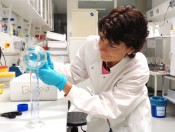Dr Maria Moreno-Villanueva

// commenced her studies in biology at the University of Murcia in Spain
// After arriving in Germany, she first completed a course of training as a cytology assistant in Tübingen
// Following this, she worked in the medical laboratory of Dr Böhm in Friedrichshafen, where she was responsible for cytology diagnosis conducted in the course of cancer screenings
// After three years here, she then moved to Konstanz, where she completed her biology degree while working part-time for Dr Stocker
// In 2008, she obtained her doctorate magna cum laude from the Molecular Toxicology department
// Maria Moreno-Villanueva has been a manager in the EU project MARK-AGE (www.mark-age.eu) since 2008, and a research assistant at the University of Konstanz since 2011, where her work in the Molecular Toxicology Group involves repair mechanisms for damaged genetic material
// She has received numerous accolades for her work, including the Ursula M. Händel Animal Welfare Prize (2011, shared with her doctoral supervisor Prof. Alexander Bürkle), the “Mujer del Año” (“Woman of the Year”) prize from the Spanish region of Murcia (March 2014) and the Ecology Prize from the University of Konstanz’s “Environment and Living” foundation (July 2014)
// On March 1st, 2015, she will begin a research year abroad at the NASA Johnson Space Centre in Houston, USA, funded by the German Research Foundation
Contact: laborundmore@succidia.de
Molecular consequences -
von Dr Maria Moreno-Villanueva
The natural and social environment plays a decisive role in the life of an individual, and has significant repercussions for his or her physical and mental health. Factors in the social environment such as a high population density or noisy cities with traffic congestion and light pollution are considered to be potential stress factors. Social relationships and the working environment also exert a considerable influence on a person’s psyche ... 
|







